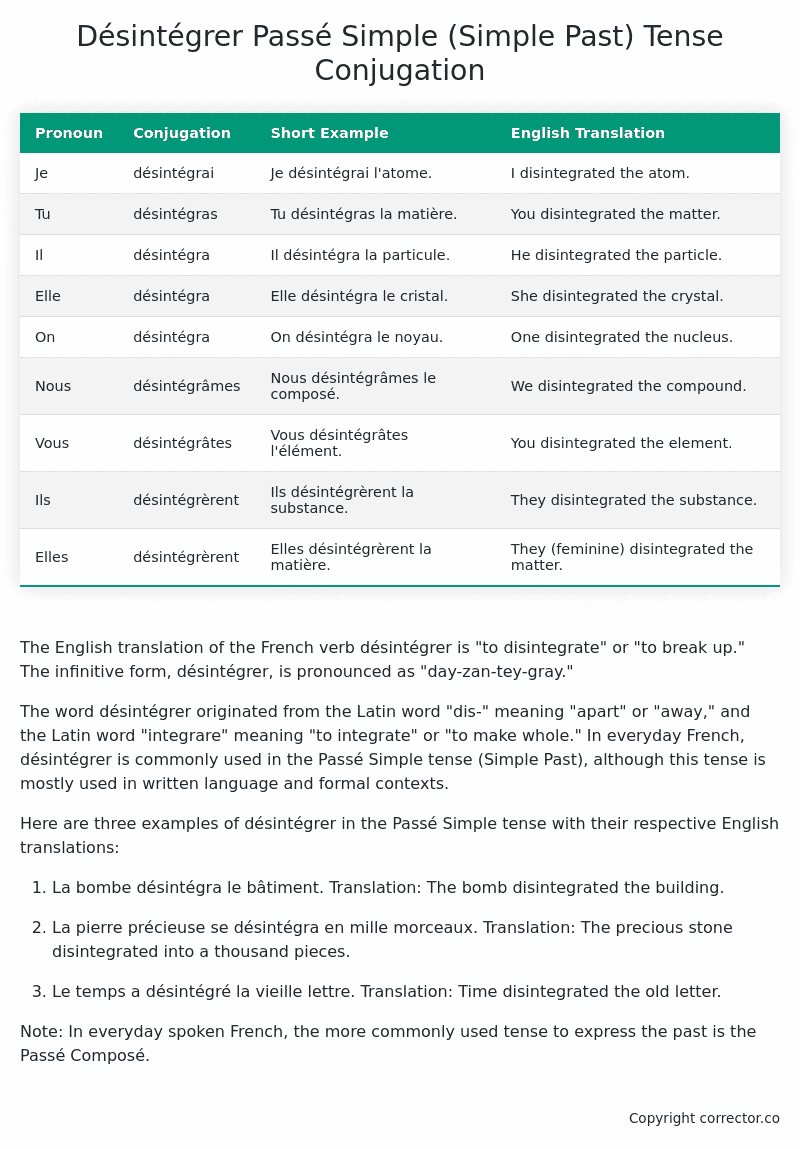Passé Simple (Simple Past) Tense Conjugation of the French Verb désintégrer
Introduction to the verb désintégrer
The English translation of the French verb désintégrer is “to disintegrate” or “to break up.” The infinitive form, désintégrer, is pronounced as “day-zan-tey-gray.”
The word désintégrer originated from the Latin word “dis-” meaning “apart” or “away,” and the Latin word “integrare” meaning “to integrate” or “to make whole.” In everyday French, désintégrer is commonly used in the Passé Simple tense (Simple Past), although this tense is mostly used in written language and formal contexts.
Here are three examples of désintégrer in the Passé Simple tense with their respective English translations:
-
La bombe désintégra le bâtiment.
Translation: The bomb disintegrated the building. -
La pierre précieuse se désintégra en mille morceaux.
Translation: The precious stone disintegrated into a thousand pieces. -
Le temps a désintégré la vieille lettre.
Translation: Time disintegrated the old letter.
Note: In everyday spoken French, the more commonly used tense to express the past is the Passé Composé.
Table of the Passé Simple (Simple Past) Tense Conjugation of désintégrer
| Pronoun | Conjugation | Short Example | English Translation |
|---|---|---|---|
| Je | désintégrai | Je désintégrai l’atome. | I disintegrated the atom. |
| Tu | désintégras | Tu désintégras la matière. | You disintegrated the matter. |
| Il | désintégra | Il désintégra la particule. | He disintegrated the particle. |
| Elle | désintégra | Elle désintégra le cristal. | She disintegrated the crystal. |
| On | désintégra | On désintégra le noyau. | One disintegrated the nucleus. |
| Nous | désintégrâmes | Nous désintégrâmes le composé. | We disintegrated the compound. |
| Vous | désintégrâtes | Vous désintégrâtes l’élément. | You disintegrated the element. |
| Ils | désintégrèrent | Ils désintégrèrent la substance. | They disintegrated the substance. |
| Elles | désintégrèrent | Elles désintégrèrent la matière. | They (feminine) disintegrated the matter. |
Other Conjugations for Désintégrer.
Le Present (Present Tense) Conjugation of the French Verb désintégrer
Imparfait (Imperfect) Tense Conjugation of the French Verb désintégrer
Passé Simple (Simple Past) Tense Conjugation of the French Verb désintégrer (You’re reading it right now!)
Passé Composé (Present Perfect) Tense Conjugation of the French Verb désintégrer
Futur Simple (Simple Future) Tense Conjugation of the French Verb désintégrer
Futur Proche (Near Future) Tense Conjugation of the French Verb désintégrer
Plus-que-parfait (Pluperfect) Tense Conjugation of the French Verb désintégrer
Passé Antérieur (Past Anterior) Tense Conjugation of the French Verb désintégrer
Futur Antérieur (Future Anterior) Tense Conjugation of the French Verb désintégrer
Subjonctif Présent (Subjunctive Present) Tense Conjugation of the French Verb désintégrer
Subjonctif Passé (Subjunctive Past) Tense Conjugation of the French Verb désintégrer
Subjonctif Imparfait (Subjunctive Imperfect) Tense Conjugation of the French Verb désintégrer
Conditionnel Présent (Conditional Present) Tense Conjugation of the French Verb désintégrer
Conditionnel Passé (Conditional Past) Tense Conjugation of the French Verb désintégrer
Conditionnel Passé II (Conditional Past II) Tense Conjugation of the French Verb désintégrer
L’impératif Présent (Imperative Present) Tense Conjugation of the French Verb désintégrer
L’impératif Passé (Imperative Past) Tense Conjugation of the French Verb désintégrer
L’infinitif Présent (Infinitive Present) Tense Conjugation of the French Verb désintégrer
L’infinitif Passé (Infinitive Past) Tense Conjugation of the French Verb désintégrer
Le Participe Présent (Present Participle) Tense Conjugation of the French Verb désintégrer
Le Participe Passé (Past Participle) Tense Conjugation of the French Verb désintégrer
Struggling with French verbs or the language in general? Why not use our free French Grammar Checker – no registration required!
Get a FREE Download Study Sheet of this Conjugation 🔥
Simply right click the image below, click “save image” and get your free reference for the désintégrer Passé Simple tense conjugation!

Désintégrer – About the French Passé Simple (Simple Past) Tense
Formation
Usage
Narration
Historical Context
Interactions with other tenses
Passé Composé
Imparfait
Conditional and Subjunctive
Summary
I hope you enjoyed this article on the verb désintégrer. Still in a learning mood? Check out another TOTALLY random French verb conjugation!


